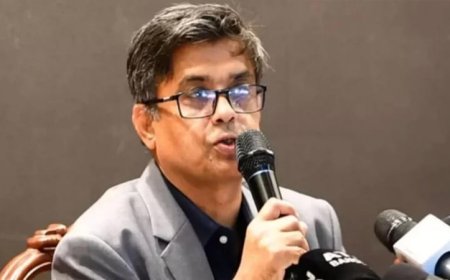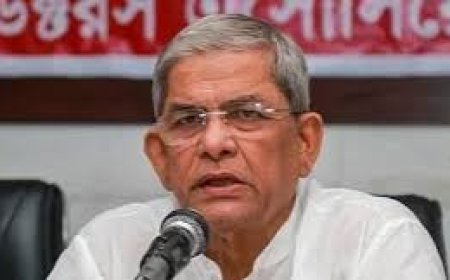"India requires a definitive security assurance from Bangladesh."
"India requires a definitive security assurance from Bangladesh."

The relationship between India and Bangladesh has faced some strains following the fall of the Awami League and the sheltering of Sheikh Hasina in India. Prof. Sreeradha Datta, a South Asian expert at OP Jindal Global University, shared her insights on the future of India-Bangladesh relations in an interview with The Daily Star's Diplomatic Correspondent, Porimol Palma.
How is India perceiving Bangladesh after its recent political changes?
Historically, India has supported the Awami League (AL), fearing the rise of an Islamist party if the AL loses power. However, this concern is not currently reflected in Bangladesh's political landscape. India has built a significant relationship with the AL, which has led to increased bilateral trade that has also benefited Bangladesh. Nevertheless, India does not have a policy that restricts cooperation with any other government in Bangladesh. Relations between sovereign states should be founded on equality, a principle frequently reiterated by Bangladesh's current leadership.
Claims attributing responsibility for the recent floods in southeastern Bangladesh to India are unfounded. Furthermore, some statements from senior Indian leaders have been unhelpful and counterproductive.
What immediate steps should be taken to improve relations?
I believe that Dhaka and New Delhi are already in communication. I recommend that both nations engage in formal dialogue as soon as possible to address any lingering issues. India requires clear assurances that no anti-Indian activities will be launched from within Bangladesh. The central issue is India's belief that only the AL can adequately address its security concerns, a perception I view as misguided. If Dhaka can reassure Delhi regarding its security apprehensions, it could form the basis for a stronger relationship. The interim government should also communicate to India which pressing issues need attention concerning Bangladesh. Thus far, the interim government has not articulated any threats that could justify India's concerns.
While there have been recent attacks on Hindus in Bangladesh, the reasons behind these incidents are understood. However, numerous other events are happening that do not receive adequate attention. It seems the BNP is becoming increasingly vocal. Although the BNP operates separately from the interim government, it appears to be gaining influence. The interim government should effectively manage any aggressive rhetoric, as it sends the wrong message. Some experts argue that religious fundamentalism is not a significant factor in Bangladesh, and I share this perspective.
How does Delhi perceive the recent events regarding attacks on minorities in Bangladesh?
I agree that there is a lot of misinformation. Nevertheless, there is a prevailing belief in India that the persecution of Hindus in Bangladesh is increasing due to Hasina's absence from power. While these incidents are not as widespread as reported in the media, the public perception has turned negative. On August 15, Prime Minister Narendra Modi addressed the persecution of Hindu minorities in Bangladesh but neglected to mention that others have also faced violence. This omission is significant. It's essential to recognize that these matters are tied to our domestic politics, and a negative perception is being cultivated. Consequently, leadership from both sides should meet and issue a joint statement affirming that their relationship should be that of two sovereign states.
How do you view the issues of border killings and water disputes affecting the relationship?
Border killings can be mitigated if both countries collaborate. Even a low number of incidents should not occur between friendly nations. In 2010, we proposed an agreement for the basin-wide management of transboundary rivers and pledged to address issues concerning other rivers, if not the Teesta. Why has this not been implemented? India must resolve the water-sharing issue. Just as security is crucial for India, water is equally vital for Bangladesh. Had there been a temporary arrangement for water sharing, anti-India sentiments might not be as pronounced as they are now. Given that the water-sharing matter is highly emotional for Bangladesh, India must take appropriate action.
There is a perception that India has benefited more from the agreements made during the AL regime. Is there a possibility of reviewing these agreements?
While it may not reflect well on India, Bangladesh has the right to review these agreements. I understand that many MoUs were not debated in parliament. I believe the connectivity projects completed thus far have been beneficial for both nations. However, if Bangladesh seeks to revisit any agreements, such as those regarding transit, it is well within its rights to do so. India has acted transparently in these matters, and revisiting the MoUs could clarify their utility.
Why have some projects under the Line of Credit stalled due to Indian contractors not resuming work?
I think this situation stems from a lingering sense of apprehension. While we do not have definite information, the data we are receiving is somewhat concerning. If Bangladeshi authorities can assure India that they have no security concerns, progress can be made.
The interim government has mentioned steps to potentially bring back Sheikh Hasina for legal reasons. Could this create friction in relations?
This situation involves various legal and technical considerations that Bangladesh must address. Sheikh Hasina cannot simply be extradited at Bangladesh's request. We cannot overlook India's relationship with the AL or Sheikh Hasina, but we also wish to collaborate with Bangladesh.
Our foreign adviser mentioned that India's relationship should extend to the people of Bangladesh, not just the AL. What do you think?
I completely agree. India should work with whichever government is in power in Bangladesh. Tensions arose during the government from 2001 to 2006, which soured relations. Subsequently, we discovered that the AL had a friendly disposition towards India. In a multiparty system, any government can be elected, so why shouldn't India work with it? Unfortunately, it was the BNP that fostered anti-India sentiment in Bangladesh during that period. In 2004, under the BNP-Jamaat regime, a significant cache of arms allegedly intended for the Indian separatist organization ULFA (United Liberation Front of Assam) was seized in Chattogram.
The interim government wants to revitalize SAARC. What is your opinion on this?
SAARC is crucial for cooperation in South Asia, but Pakistan needs to change its approach. We have consistently expressed our willingness to collaborate with Pakistan if it does so, but that has not been the case.
What's Your Reaction?




















































































